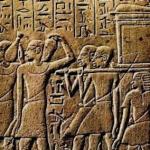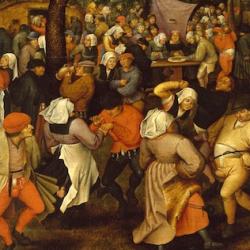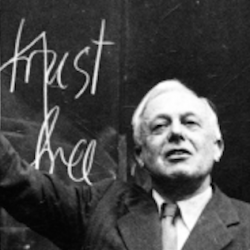One of the key distinctions in Rosenstock-Huessy’s grammatical sociology is that between names and words. In his brief discussion of this distinction in The Christian Future (CF), he begins with an expression of his horror at John Dewey’s notion that “We have to find another set of words to formulate the moral ideal.” Rosenstock-Huessy says that the sentence simultaneously calls us to action and “paralyzes the action.”
Part of the problem is the reduction of moral life to a set of words: “I shall never trust a man’s attempt to formulate our faith if I know that he considers his formula as a mere set of words. I shall not listen to sets of words. They are like sets of china or any other dead things. You cannot draft soldiers for ‘sets of words’” (CF 7).
What motivates action is not a “set of words” but a name, a sacred name. Liberalism is paralyzed because it mocks the sacredness of names, but at the same time wants to motivate us to act, and act strenuously, for something. But the only thing that will motivate is a call in the “name” of some hope for the future. At the center of Dewey’s error is his confusion of “the consumption of words and the creation of compelling names.”
In the commercial world, words are “like poker chips,” and “so they are consumed just as we eat our daily bread – in the form of descriptions, advertising, propaganda, bills.” An advertiser takes up pre-existing names, attaches them to his product, and sells his goods. For the businessman, a name is an arbitrary label that helps him increase sales (CF 8).
Dewey and all idealists think that names always function as they do in commerce. But there’s a difference between a “Lincoln” car and the “Lincoln” who lends his name to the car. Lincoln became a usable commercial word because in his life Lincoln combined words and deeds: “Names are so sacred because they constitute the unity of the conflict of words and deeds in human life. Hence names are priceless; words have their price. Words can be definite, names must have an infinite appeal. Names must make us act in ways which seemed unbelievable before they were done; words express the things which are to be had at a known price in figures” (CF 8).
In a discussion of “speech versus reflection” in The Origin of Speech (OS), Rosenstock-Huessy develops his treatment of names. Names are not labels but rather “promises and commands, invitations to the bearer and to the spirit invoked upon the bearer and to the community calling the bearer by this spirit’s power” (OS 34). Names are taboos, protecting a “child against abuse by its parents” as “an amulet and a charm.” They are appeals to responsibility. And they are means for offering praise to God (OS 35).
A name, like all genuine speech, is always a triune event, involving the public, the speaker, and the inspiration that animates the speaker. To speak, or to name, involves affirming the truth of what is said, being willing to stand up for what is said, and insisting that what is said should be accepted by everyone in the community (OS 34-35). To name is to face the public, to call the one named, and to invoke a spirit that will enable the one bearing the name to fulfill the calling.
He summarizes the whole discussion in a few paragraphs in Speech and Reality (SR). Nouns, he says, classify “the stone, the rain, the deer, the tree as beings outside, as objects of which we cannot be sure that they are brother sun and sister moon.” But we don’t deal with even external reality only as nouns. It’s reasonable to have inside names as well as outside names; we give pet names to our spouses that we won’t use in public, and nicknames to our children. So also, poets rightly consider sun, moon, stars, trees and tigers are people, but for the nominal-based scientist this is not appropriate.
Inside the circle of friendship and love, we employ names, not nouns: “we all have two or three names. One is our name as a friend, inside one community; the other signifies our worldly existence, among a hostile world of demand and supply and the struggle for existence. By another name, or by the weight of a family name, we may trace our historical background, our past, or let it be traced by others. And that certain names given to us in the cradle, also contain a challenge to secure future action by the carrier of the name, is too well known.”
The notion that names are callings, pointers to a future, is in decline, and the result is that “we see him hide in his ancestors, his race, his country, or his class; and because he ceases to take his name as a challenge, he allows himself to be classified as determined by membership in a group, by exposure to environment, or by racial inheritance” (SR 129).
We can make a similar point by noting that proper names have the quality of an imperative, and as imperatives form us as “Is” so do names: “A person’s being addressed by his own distinguishing proper name precedes any thinking about himself the ‘I’ may do.”
To say “I” is to become an object to oneself, but that doesn’t occur until we have first been addressed. A “man who is distinguished by a proper name, unlike the classifiable things of the outside world: trees, tables, stones, or houses,” is table to come to consciousness of himself, to resist and say Yes or No. The “I” is a product of this resistance, but it presumes that the man has been addressed by name (Practical Knowledge of the Soul, 17).












